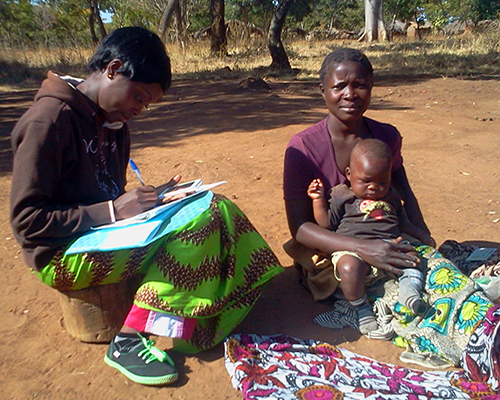Impact Evaluation of USAID’s Climate Smart Agriculture Pilot under the Tenure and Global Climate Change Program
Global Development

In Zambia, The Cloudburst Group has designed and is implementing a Randomized Control Trial impact evaluation for a USAID climate smart agriculture pilot under the Tenure and Global Climate Change (TGCC) project that explores the relationship between achieving climate change adaptation and mitigation goals and strengthening resource tenure. The pilot works at the chief, village and household levels supporting conservation agriculture, agroforestry extension services and tenure interventions.
The TGCC impact evaluation involves a four-arm, randomized control trial (RCT) design that will identify impacts at the village and household levels. 294 villages were randomly assigned to one of the four treatment arms. Data was electronically collected to establish the baseline (2014) and will be collected again at the end of the third year of the project (2017). Between these points The Cloudburst Group will implement a short village-level survey with key aggregate indicators across control villages to track outcomes not regularly collected by the TGCC implementing partner Monitoring and Evaluation teams in the treatment areas. The impact evaluation tests a number of research hypotheses including whether the tenure interventions reduce conflict and whether enhanced perceptions of tenure security contribute to increased uptake of climate smart agriculture practices and water conservation. The impact evaluation will assess direct and joint impacts of the agroforestry extension intervention and tenure strengthening interventions on four outcomes: changes in planned and actual agricultural investment and other land use plans; household behavior change around agroforestry and related climate smart agriculture activities; long-term outcomes related to agricultural productivity, livelihood improvements and climate resilience; and, changes in household perceptions of tenure security over smallholdings.
The Cloudburst Group developed all impact evaluation instruments. These consist of a large-N household survey (~3,500 respondents); a headperson survey; key informant interviews; land key information interviews (those focused on land issues); and focus group interviews with female-headed households, cash croppers versus subsistence producers, matrilineal versus patrilineal households and land constrained versus poor households. Some aspects of the survey were modeled on the 2001-2012 Rural Agriculture Livelihood Survey. All instruments were peer reviewed by external reviewers. Investigators are paying particular attention to the heterogeneity of impacts among particular subgroups and will be disaggregated on a number of factors. We are working with a local data collection firm to train enumerators and qualitative researchers to electronically gather data (using Open Data Kit) and comply with human subjects’ research requirements.
Our external research partners in this Impact Evaluation are Cynthia Caron, PhD, Clark University and Lauren Persha, PhD, University of North Carolina.
Learn More
Ask the Expert: Lauren Persha, PhD
We sat down with Dr. Lauren Persha after the 2015 World Bank Conference on Land and Poverty to talk about her work and area of expertise. Dr. Persha is an Assistant Professor of Geography at UNC-Chapel Hill and a Research Advisor for The Cloudburst Group on the impact evaluation of USAID’s Tenure and Global Climate Change project in Zambia.
